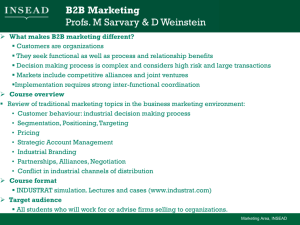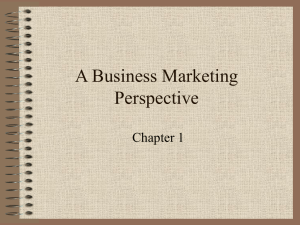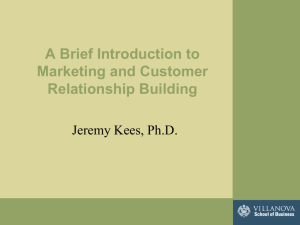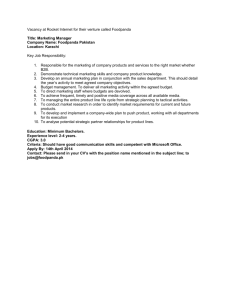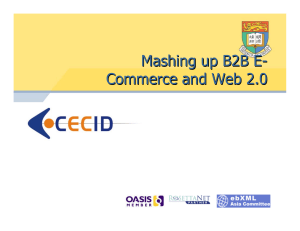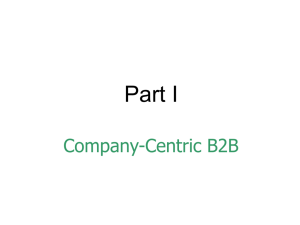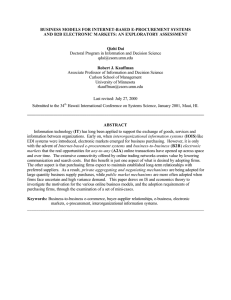E-commerce: A Survey
advertisement
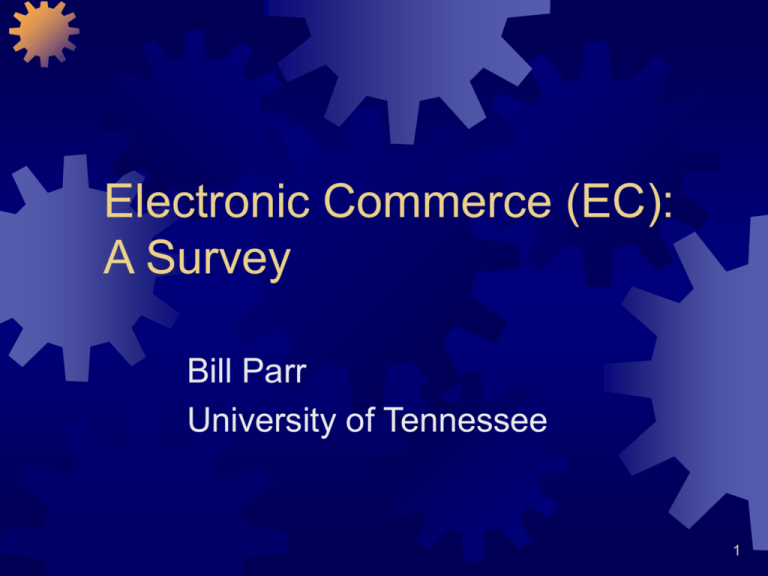
Electronic Commerce (EC): A Survey Bill Parr University of Tennessee 1 Outline Introduction Growth rates for EC A brief word on B2C Extended thoughts on B2B EC Benefits and Limitations of EC Conclusions and Solicitation for Input 2 Definition Electronic commerce is the process of buying and selling or exchanging of products, services, and information via computer networks including the Internet. Turban, Lee, King and Chung (2000) 3 Words from Jack Welch “Digitizing a company does more than just create unlimited business opportunities; it puts a small company soul into that big company body and gives it the transparency, excitement and buzz of a start-up. It is truly the elixir for GE and others who relish excitement and change. Ebusiness is the final nail in the coffin for bureaucracy at GE.” Jack Welch, GE Annual Report 1999 Check it out at http://www.ge.com/annual99/letter/letter_four.html 4 The growth of online commerce ($B) 8000 7000 6000 5000 USA World 4000 3000 2000 1000 0 1999 2000 2001 2002 2003 2004 2005 Source: Goldman, Sachs & Co. analysis and report 5 B2B Predicted Growth From 1999 – 2004: 50X per Gartner Group In 1997 - $10 billion of B2B transactions were conducted over the internet 6 B2B EC Predicted Percent of Revenue for 2003 Industry Computing, electronics Motor vehicles Petrochemicals Utilities Paper/office products Shipping/warehousing Food/agriculture Percent in 2003 39.3% 14.7% 13.5% 25.8% 5.6% 17.2% 3.0% Source: Forrester Research, Inc. (1998) 7 Most bluntly B2B EC is predicted to grow to $1,330.9 billion by 2003 This means B2B EC grows from .2% of B2B in 1997 to 9.4% of B2B in 2003 Source: Forrester Research, Inc. (1998) Assessment: They’re probably being very conservative!!! 8 Experiences with B2C EC (briefly…) 9 Amazon – A Case Study Founded July 1995 Sold $15.7 million in 1996 Sales of $600 million in 1998, monthly growth of 34 percent 10 million titles in catalog Inventories only a few thousand highselling titles (rest handled through Ingram) 10 Amazon Case – results 42 turns at Amazon versus 2.1 at Barnes & Noble brick and mortar stores (1996) Selling 14.2 percent cheaper than brick and mortar stores Customer has search capability, information, customized hot lists, … Financials – continue to be problematic! Can anybody make serious money with this business model? Interesting part – the relationship with Ingram Puzzle – providing and creating value without CAPTURING VALUE! 11 Experiences with B2B EC 12 What’s B2B EC for? Electronic marketing (CISCO, Intel) Procurement Management (GE TPN) Electronic intermediaries (Boeing) Just-in-time delivery (FedEx) EDI Intranet Extranet Integration with back-end information systems 13 Intel – A Case Study Products: microprocessors, motherboards, imbedded chips, chipsets and flash memory EC site sales went to $1 billion per month in first month in operation in 1998 Site Self-service extranet Procurement and customer support Reaches several hundred small/midsize business customers worldwide Orders entered manually using browsers Order tracking Product documentation, structured help Target – Companies not connected to Intel via EDI 14 Intel Case Study - results 1999 cost savings – eliminated 45,000 faxes per quarter to Taiwan alone Intermediaries indicate they are not threatened by Intel’s EC initiatives “I don’t think Intel’s strategy is to touch 100,000 customers a day. Somebody has to stock and sell by ones and twos. Someone has to pull them and pack them the way the customer asks for them.” Earle Zucht Senior VP, Wyle Electronics 15 Word from Lou Gerstner of IBM “E-business is all about cycle time, speed, globalization, enhanced productivity, reaching new customers and sharing knowledge across institutions for competitive advantage.” 16 Boeing Corporation 1997 – Boeing Corporation reported a 20% savings after posting a request for proposal for manufacturing a subsystem on the Internet Vendor from Hungary won the bid, delivered more cheaply, and delivered quickly A more efficient market? 17 Using EC at Cisco Cisco as a model: $20B business 75% or more of manufacturing outsourced 50% of orders routed to supplier who ships direct Gross margin: 65%; Net margin: 28% Savings in service and support from customer self-management: $500m/year 18 Cisco Case - Benefits Savings in 1998 of 17.5% of operating costs Technical support productivity up by 200 to 300% Technical support costs down by $125 million (against increasing sales) Software distribution reduced by $180 million due to customers downloading new software releases, Web-based CD-ROMs, … Check it out at http://www.cisco.com 19 General Electric Case Study 1996 piloting of company’s first online procurement system (Trading Process Network) at GE Lighting – http://tpn.geis.com Sourcing receives requisitiong electronically from internal customers, sends off bid package to suppliers via the Internet “destroyyourbusiness.com” – January 1999 20 General Electric Case Benefits Labor involved in procurement declined by 30% Materials costs declined 5 to 20% 60% of staff in procurement redeployed, remainder still had six to eight days per month free for strategic activities Time to identify suppliers, prepare request for bid, negotiate price and award contract cut from 20.5 to 10 days Information shared across GE procurement departments about best suppliers 21 More about the GE TPN process Sellers participate as follows: 1. Buyers prepare bidding project information 2. Buyers post bidding projects on the Internet 3. Buyers invite potential suppliers 4. Buyers invite suppliers to bid on projects 5. Suppliers download project information from WWW 6. Suppliers submit bids for projects 7. Buyers evaluate suppliers’ bids, negotiate electronically 8. Buyers accept bids best meeting their requirements 22 Walmart Case Study – Collaborative Forecasting and Replenishment – single short-term forecast, frozen Example link with Warner-Lambert via EDI CFAR 23 Classifying EC Applications markets – buying and selling goods and services Interorganizational systems – inter and intra-organization flow of information, communication and collaboration Customer service – providing customer assistance, information and problem resolution Electronic 24 From Business Week, September 2000 55% of UPS business is EC 10% of FedEx business is EC Difference: FedEx requires use of their proprietary software! Possible lesson? 25 A phenomenon Small players enter, establish viability Big players observe, enter and strike back Example: GE/ Ford, Daimler Chrysler February announcement of online exchange for automotive parts and supplies 26 Trends per WSJ The B-to-B shakeout has begun, and it isn't pretty. Last year, analysts predicted there would be as many as 10,000 sites by now -- ranging from real-world suppliers that offer their goods online to Internet start-ups that don't actually sell anything, just provide venues where buyers can hook up with sellers. But a recent study by Deloitte Consulting LP, a New York-based unit of Deloitte Touche Tohmatsu, puts the number of B-to-B sites at a much more humble 1,488 -and falling. Dozens of start-ups have already shut down, and analysts say that by this time next year hundreds more will have joined them. The sites faring the best are traditional suppliers that have moved online. Wall Street Journal report, October 23, 2000 27 A question . . . Can the efficiency of capital markets be created in markets for almost everything? Bill Gates’ notion of frictionless capitalism 28 Benefits of EC Minimal capital outlay Reducing cost of transactions Highly targeted marketing Pull-type processing enabling customization (Dell) Cycle time reduction Enables reengineering projects 29 Current limitations of EC Outstanding security and reliability issues Integration with ERP software can be difficult Uneven existence of standards Shortage of bandwidth Pure in-house development of EC is difficult and can be costly 24x7 availability and expectations can be brutal! 30 Questions Can ERP keep up with EC? Can a tortoise try to dance with a roadrunner? Will B2B EC work to create efficient markets at micro level, or keiretsu? Channel conflict? 31 Lean Enterprise Forum resources on EC WWW site: http://leanforum.bus.utk.edu Lean Enterprise Forum Resource Group (info on study group) Lean Enterprise Forum Idea Exchange (general Q/A) 32 Still More Wisdom from Jack Welch “One cannot be tentative about this. Excuses like ‘channel conflict’ or ‘marketing and sales aren’t ready’ cannot be allowed. Delay and you risk being cut out of your own market, perhaps not by traditional competitors, but by companies you never heard of 24 months ago.” Jack Welch, July 2000, Forbes Magazine 33 Conclusions It’s already big! It’s growing explosively! The action is in B2B! Taking time and cost out of transactions, getting information, etc… Creating incredibly efficient markets (Question: Efficiency or keiretsu???) 34 A solicitation What about EC interests you? Do you have knowledge or experience to contribute? What can we do to help? 35 Interesting resources Digital Capital, by Dan Tapscott, David Ticoll, Alex Lowry – business web phenomenon Browse to http://www.i2.com/. Get scared. Get busy. (Check out IBM, i2, and Ariba.) Paul Timmers (1999). Electronic Commerce: Strategies and Models for Business-to-Business Trading http://www.ecompany.com Business Week September 18, 2000 – special insert on e.biz – A Report on Electronic Business Deloitte and Touche report: http://www.dc.com/pdf/b2b_genesis.pdf Interesting WWW site: http://ecommerce.ncsu.edu/topics/intro/intro.html 36
